2024 Various Thoughts about Tech
Below are various thoughts in 2024 about tech
2024-1 Can You Hear My Voice?
“Can you hear my voice?” was what the first woman who spoke on a phone first uttered. I got hold of this interesting photo from 1922. This lady, Rachel Smith and later as Mrs E.G. Sovereign, was the first woman who spoke on the phone. The person on the other side was the telephone inventor, Mr Alexander Graham Bell. Bell first placed his first phone wire between his home and Strawberry Hill high school in Brantford, Ontario. From the note attached to the photo, Mrs Sovereign was the bravest between the schoolteachers to have picked up the phone. Everyone else was scared. The first words that she uttered were “can you hear my voice?” rather than “hello”, per the note. What is interesting about this photo and the 100 year old paper attached to it is that there is no other reference to this event on the web. The web mentions that the first phone call between Mr Bell and Mr Watson was in 1876, and the first sentence uttered was “Mr Watson, I want to see you”. This note mentions that the word “hello” through the phone was not common at that time. This makes me believe that the event took place somewhere right after 1876. Now we take phone calls for granted. Actually, we hardly use ours phones to speak. We use it for messaging, instead. But imagine how it must have felt when someone like Ms Sovereign picked up an odd-looking device for the first time and heard a human voice through the wires. I am not sure if we will have a similar experience unless this generation will one day hear an alien voice from outer space. Or….. we may feel somewhat scared today when our phone rings and someone real human (not a spammer) says “hello”. #history #communication. People should really talk more with each others these days!

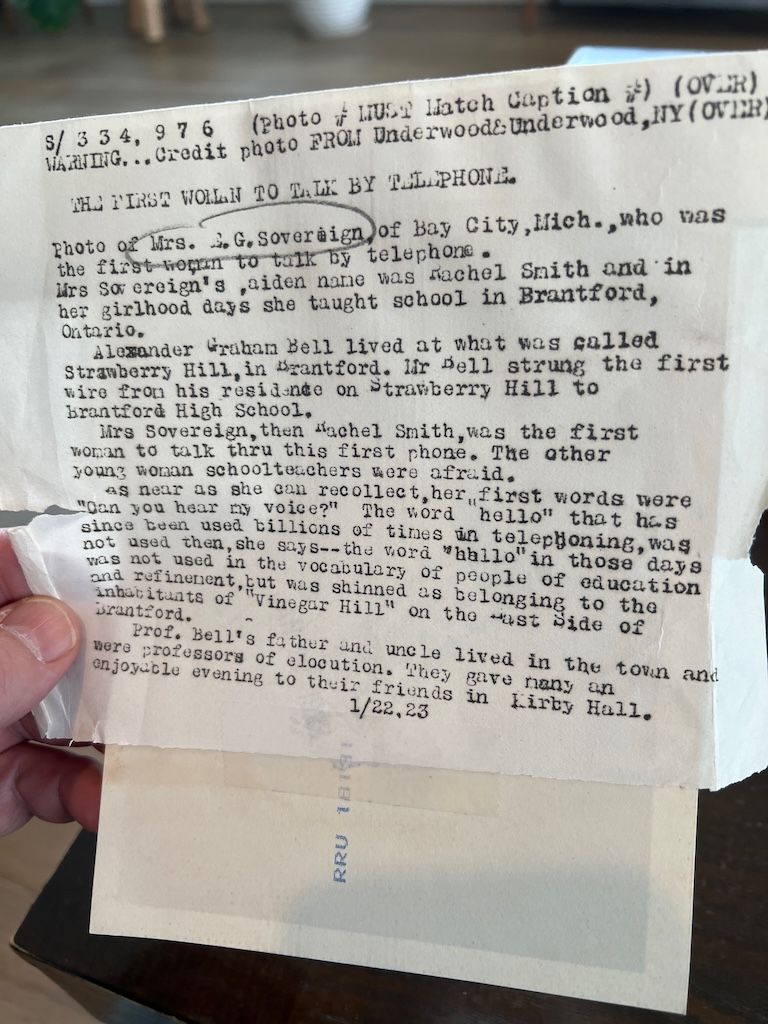
2024-1 Future of Tech
the 1945 TV of the future

2024-1 computer table
Let’s see if the #tech folks can guess which year this particular table could have been created about computers. Pay close attention to the last column which includes words like “distributed computing”, “conversational order entry”, “on-line”, “automated scheduling”. #computing
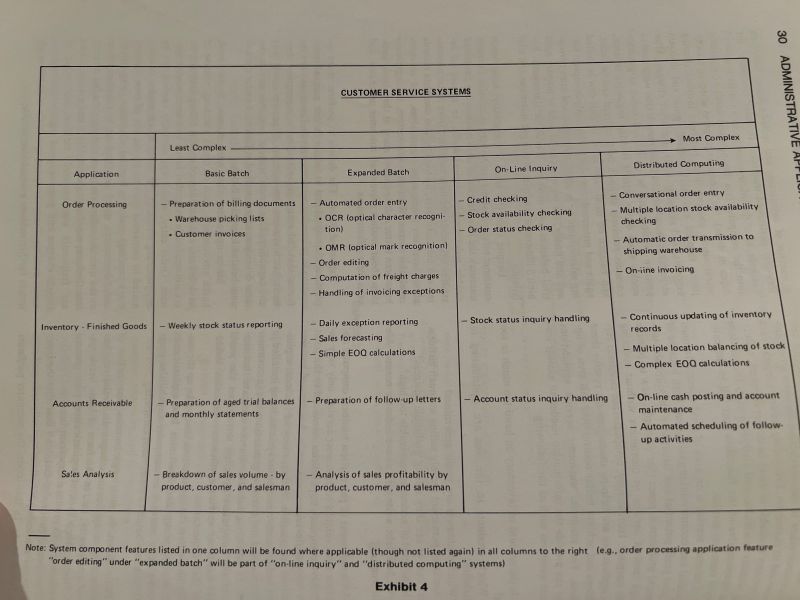
2024-1- getting started with the web
I heard it repeatedly from many non-technical or young talents on how to get started with the web. If you or anyone you know is interested in how to get started with web development (you know… that coding thingy that existed and is still essential even during the #ChatGPT and #genAi era), please refer to the following site: https://lnkd.in/gwDhUHtk #techeducation #tech
2024-1- Artificial Intelligence Magazine from 1986
1986 feels like 2024. #tech #ai #emergingtech #retrocomputing #mechanicalkeyboards
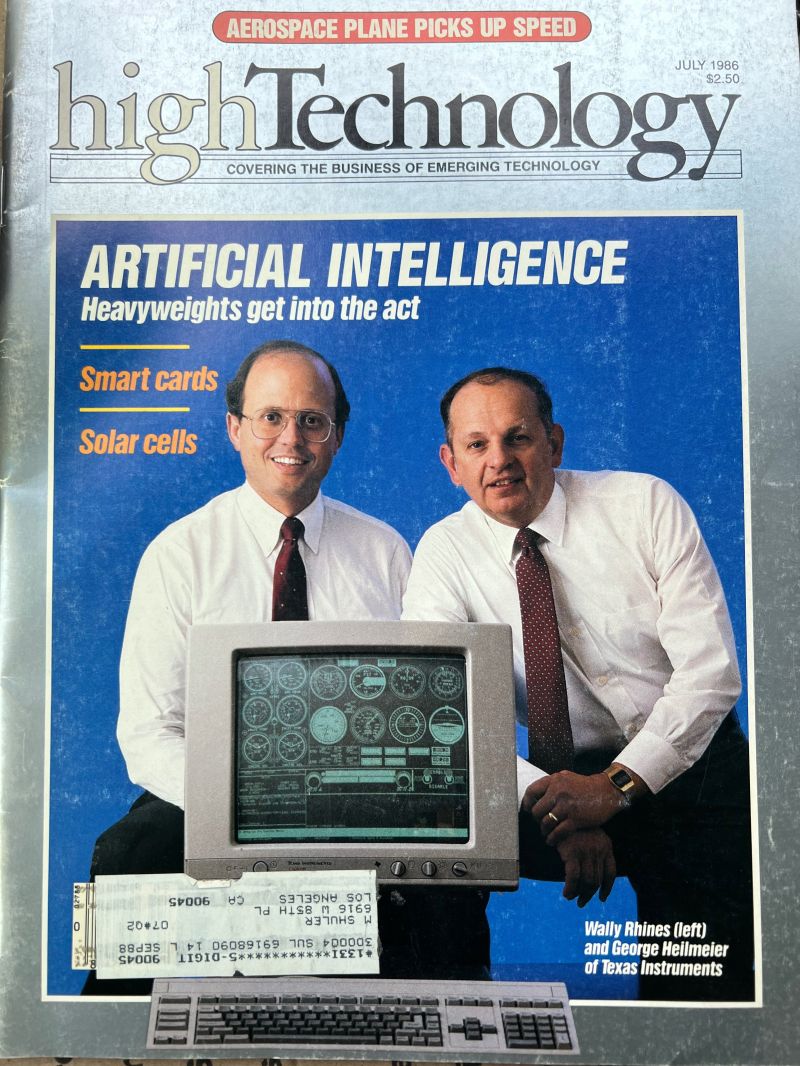
2024-2 AI Spam
Over the weekend, I encountered my first generative AI spam message. The so-called anonymous “friend” texted me twice if I could pick up “him or her” from the nearby tire repair shop. The address, along with a shared map, was indeed for the tire store next to my house. While searching my notes to see if I had any records of the phone number used, I accidentally dialed the number but immediately hung up. Right there, I got another message from the “friend” saying, “I am sorry that I missed your call. Maybe next time.” The whole new experience took less than 5 minutes, but it made me realize that getting those emails in the early 90s about the king and the money or gold that he wanted to share with me was not so bad after all. #genai
2024-4 IBM
It is the 60th anniversary of the IBM 360, the mainframe that started the enterprise computing industry. https://lnkd.in/gTaTRz-Z #enterprise #retrocomputing IBM
2024-4 Gen Ai
I am one of those techies who now believe that #generativeAI is the breakthrough of the 21st century that is kin to the discovery of computers and the Internet in the 20th century. On a more personal level, my brainstorming skills and technical development of AI solutions have fundamentally shifted in the last year because it is much easier and cheaper than ever before to have a sophisticated assistant at my disposal. I don’t treat #generativeAI as a product but as an essential tool in my work. I don’t use it to create emails or complete code, no matter how convenient that might be, because I am still old-school. Yet, it is my constant companion and essential resource for my daily work. I love it. Happy Friday.
2024-4 3.5’’ Floppy
I do not want to run out of disk space, so I ordered a ten-pack 💾
2024-4 Z80
No one might find this post interesting unless they worked with computers more than forty years ago. The z80 processor that powered and continued to power vintage computers, such as CP/M-based computers, TI-calculators, arcade machines such as Pac-Man , old appliances, Roland music synthesizers, and various other vintage computers has reached its end of life. The processor was first manufactured by Zilog in 1976, and it continued to be produced to accommodate for the vintage computer hobbyists to this day. I used the Z80 processor with the Epson QX10 computer during my high school years in the early 80. Hardware substitution to the processor already exist, but the original to the standalone DIP-based form is ending based on April 15 announcement from Mouser Electronics. RIP Z80. https://lnkd.in/gXi4FkV5
2024-4 Magazines
Three magazines shaped the computing industry in the ’70s/’80s. Popular Electronics January 1975 cover story of the Altair 8800 that inspired geeks to create the homebrew computing club. The launch of Byte magazine in September 1975 became the magazine of the computer geek world and was later followed by PC Magazine and PC World. The premier edition of MacWorld in 1984 featuring Steve Jobs and the Macintosh. The magazine went to one to inspire designers and creative people for years to make beautiful things with the Mac. #computinghistory #publishing
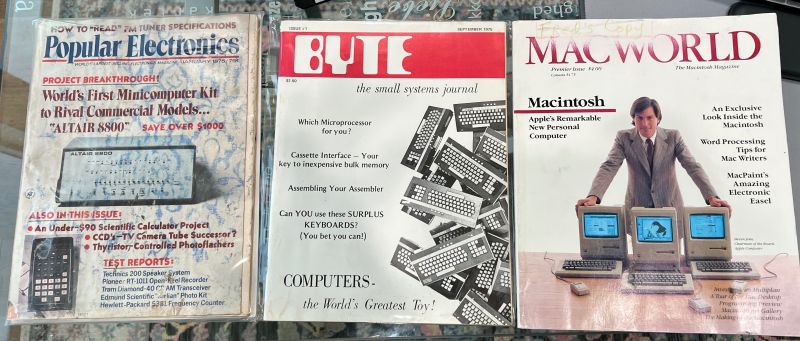
2024-5- Altair
Around this month in 1974, the microcomputer industry took off. Can you imagine that 50 years has passed? It all started with the Popular Electronics cover photo and accompanying article of the Altair 8800 in January 1975. That led to the homebrew computer club and the computers with the early Intel 8080 microprocessors and S100 bus. The club led to the first orders of the Altair 8800 , followed by the Imsai 8080 competitor, which is recognizable in the movie Wargames. The homebrew club led to the Apple computer, and the rest is history. (The copy of the rare magazine in the photo is my own). Members of the classic computing community seem to agree that April 1974 marks the launch of the Altair with the first commercial release. Hence, before this month is over, I would like to share a toast with all the computer enthusiasts out there that we ought to thank the month of April 1974 for all the computing machinery that we use every day. #tech #computinghistory
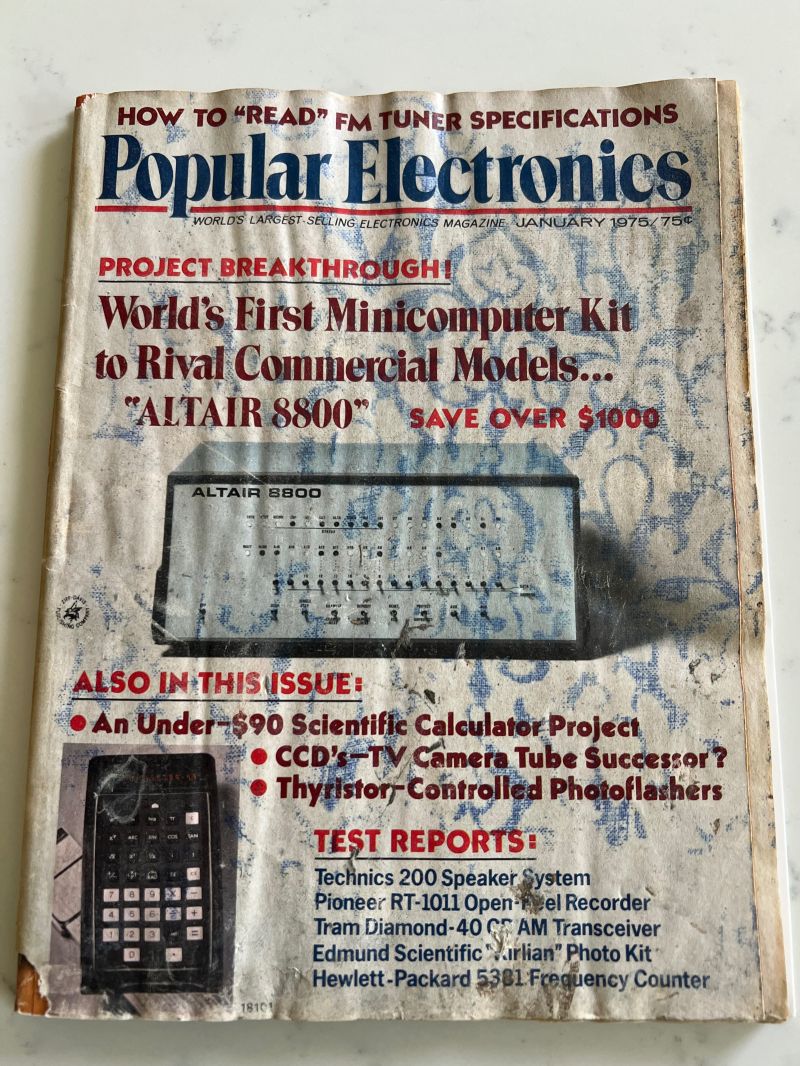
2024-5- Palestine
Over 350 indie games (Mac, Linux, Windows) are generously offered by indie game developers on itch_io for $8 as part of the “Palestinian Relief Bundle” to support the people and the children of Palestine and Gaza. Tomorrow is the last day. Please check it out. The link to the bundle is at https://lnkd.in/gt9GvKjs
2024-5- Breath
I learned an important tip this week the hard way: pause and breathe when you are stuck. It is the only way to untangle haunting problems
2024-6-26 ICQ
Rest in peace, ICQ, the instant messaging app of the 90s. Its first release was 27 years ago, and it was an excellent desktop application back when we had no messaging phones. It was through an ICQ message with a previous colleague in Lebanon sometime in 2000 that he told me about a possible job opportunity at Verizon in the US. Eventually, I landed the job and moved to the US in 2001. Though I never used ICQ after that period, I got to give credit for my subsequent US career and continued work in building and integrating messaging solutions and bots. ICQ has been officially shut off on June 26.
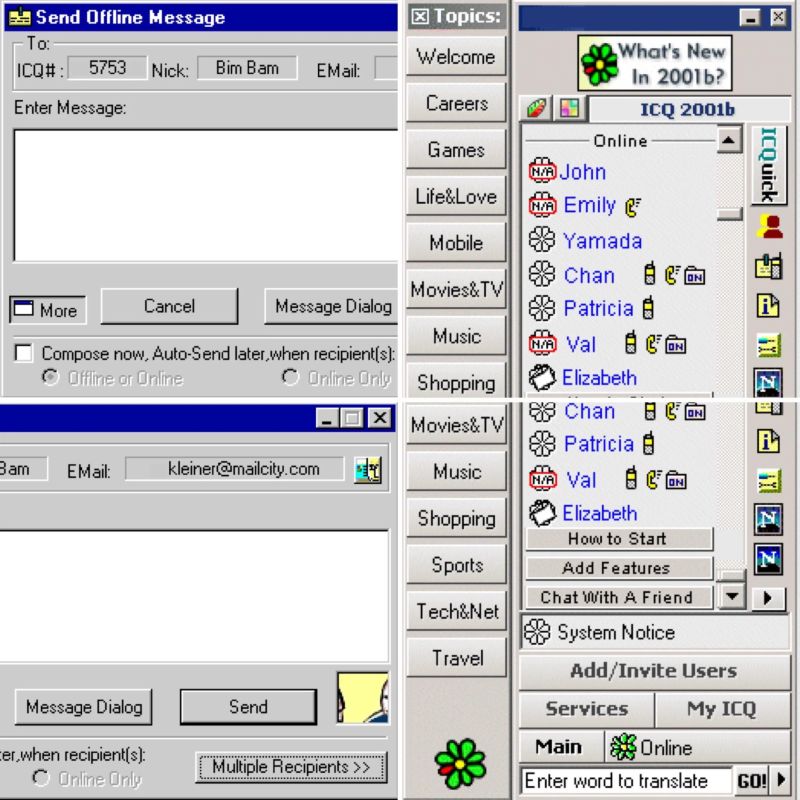
2024-06-27 Insurance Termninal
The insurance agent allowed me to photograph her terminal screen home page. She finds the 20-year-old app extremely reliable. Her colleague of the newer generation hates it because she prefers the modern web-based app they also have. The more experienced one swears she can do everything quickly with the terminal, and the younger agent agrees. The moral of the story: #retrocomputing #terminal apps rule over modern web apps in terms of speed, efficiency, and productivity. Newer is not always better.
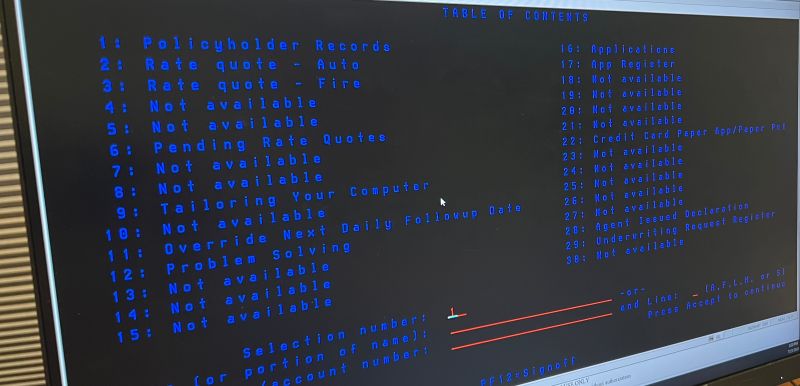
2024-07 Privacy tips
Privacy tip #1 If your personal source code means a lot to you, don’t store it in any remotely hosted code repository.Private repo are not private. Instead, only use git locally with a sync to your own server
Privacy tip #2: always keep a VPN running on your computer, tablet, and phone at all times. Enable the kill switch that disrupts your internet connection if your VPN is disconnected. Sacrifice some speed degradation for privacy, mainly when companies use your browsing to profile you and ultimately push more ads.
Privacy tip #3. Filling out a form, typing an email through webmail, and paying online through a browser has replaced all traditional mediums of the past. Many people think that only when you click send or press submit on the browser is your data processed electronically. Do you know that it is not true? Website designers can easily record every keystroke you make on their website before clicking submit. This also applies to web mail and social media. Knowing that may not stop you from what you are doing because our digital lives have taken over our analog lives. However, to protect your privacy, know that whatever you type can be stored from the moment you start typing. You have to take the website owner’s word that your data is safe because, frankly speaking, you have no choice if you care so much about that particular site. So, to protect your privacy, assume that whatever you don’t want to say, don’t type it in the first place inside your browser. You never know if what you deleted as you typed has not been stored somewhere without your knowledge.
Privacy tip #4: Malicious USB or lightning cables you use to charge your phone or connect to your computer can spy on you. Don’t assume that any cable you get for a steep discount, especially those you find or buy at odd places, is safe. Electronic cables have electronic chips that can be recreated to do many more bad things than you think cable does. Always know where you got your cables, and don’t just plug in any cable unless you know its source. If a cable acts or looks weird or asks you to activate something, don’t oblige and remove it immediately.
Privacy tip #5: Microphones: Some apps working in the background listen even when you are not talking. Know which apps have access to your phone microphone through the settings. Now you know why you see ads for something that you swore you only spoke about the other day with a friend in person. The social media app in question may not have access to the microphone, but that doesn’t mean that the company behind the app is not using other apps that it owns with the microphone turned on. It may be painful to turn off access to the microphone for apps that you use to send and receive phone calls, but at least now you know why some apps offer you a free service in return for collecting far more data through you. For desktops, it is best to keep the microphone on mute when you are not talking or are away.
Privacy tip #6. If you are not tech-savvy, don’t let anyone sell you the word “encryption” or “encrypted” without fully understanding what it means. Unless you know that only you have the key to whatever encrypted data you own, there is a possibility that someone else has the key. Hence, your data is no longer private. Some companies that claim to protect your data have yielded to giving their decryption keys. Some companies had their encrypted data stolen because of malicious attacks that stole decryption keys.Moreover, some people failed to recall encryption keys and lost valuable data, including crypto. So, anytime you encounter something related to encryption, learn precisely what it means and who owns the keys to the decryption. Hopefully, the owner is you and only you.
Final and ultimate privacy tip #7 AI: Once upon a time, we mostly used search engines to get information. The search output cannot lie. We see exactly what the web has as information about us. If something is wrong, we can flag the search results to the search provider so that they delete the information from the search index. Then, we can flag the content with our information to the site owner and request that our data be deleted. It doesn’t always work this way, but at least we had some control over our data on the web. With the recent transformation towards everything we search in AI LLM proprietary data with aggregated information based on previously scraped from the web without anyone’s permission, there is hardly any way to control what data is being shared by the renewed search engine providers on the web. Personal data leakage has become the norm rather than the exception on the web. What AI engineers refer to as a chatbot “hallucinating” is the irresponsible way of saying, “It is not the bot owner’s fault, but the fault of what is on the web, and we cannot change the logic of what we created to clean the web from what is right and what is wrong.” Hence, whatever personal data exists on the web about us is stored forever in AI models, online data archives, and copies and copies of web data that are impossible to track down. With more and more generations publishing personal and sharing content on the web, especially on social media, and more companies/governments pushing for more digitization of our identities and our lives in general, there will always be more threats against personal privacy and even lesser guarantees that our digital footprints are secured. My seventh and final privacy tip is as follows. Know that everything you do on the web is stored on the web forever. Every photo, video, document, code, audio, keystroke, text, and sensory information is stored somewhere, sometimes with your explicit consent because you desperately want to use the digital product due to the fear of missing out, sometimes with your implicit consent since you did not read the terms of service, and sometimes without your permission at all. Be wary of what you do on the web. Limit your exposure when you can. Educate yourself, your family, friends, and neighbors about what you learned against human privacy. Hopefully, through self-awareness, we can take back ownership of our digital data and be the ones who do not let others have complete control of our digital lives.
2024-8- LLMs
LLMs are great, but they completely sucked the fun of coding. For me, it is the same thing as switching from a badass fuel-powered, oil-leaking stick-shift BMW to a battery-powered, silent, no-thrill car with a tablet and no actual driving except keeping your hands on the steering wheel because you must. With genAI, coding is no longer a science but a mere trial and error in English linguistics where all you are required to do is replace a noun or an adjective in a prompt and beg for the LLM to answer you correctly. I work in AI, but I am so disgusted by LLMs and by anything that does not challenge you mentally or does not let you use your natural human brain appropriately.
2024-8- Locked
It seems we are heading to a closed web rather than an open one as tech companies compete with one another on AI. I can hardly see any content without being required to sign in. For example, my family shares TikTok or Instagram videos with me, but I cannot view them unless I sign in to such platforms. I tried a YouTube link just now and received a message that I have to sign to confirm that I am not a bot to “protect our community” (our <- means the tech giant). I won’t be surprised if I won’t be able to access an open-source GitHub repo in the future unless I sign in. Reading tweets is already a distant past since I no longer wish to sign in to social media platforms. Even WhatsApp sent me a recommendation to share my email, not just my phone number. Imagine you are forced to sign in to Wikipedia to read something there. The irony is that much of the LLM data was built on large companies grabbing anything they can find online, including content from their competitors. Now that they have done that, they probably realized that there is a competing advantage between what they offer versus what their competitor offers. Hence, it is only wiser to lock any public access. Suppose they force people to sign in, especially to those platforms that were once accessible to anyone without signing in. In that case, they will declare that they are doing it to protect the community against “bots,” which, funny, are the ones that created such bots in the first place. Moreover, more sites requiring more people to sign in means more people using the same passwords on different platforms, which would lead to even more security hacks. Seriously, the tech giants’ actions against each other are not protecting the global community but instead protecting themselves from one another.
2024-8 book reading
In the book-to-read-at-the-beach-for-ultra-computer-geeks like me, a compilation of essays from the 1980s discusses the future of computing. The articles correctly predicted generative AI, virtual reality, and computers taking over our lives. This excellent Omni Book of Computers and Robots (1981) authors include Ted Nelson, Arthur Clarke, Marvin Minsky, and many more. I highly recommend it. A downloadable pdf is available at https://lnkd.in/gXdi_6xC
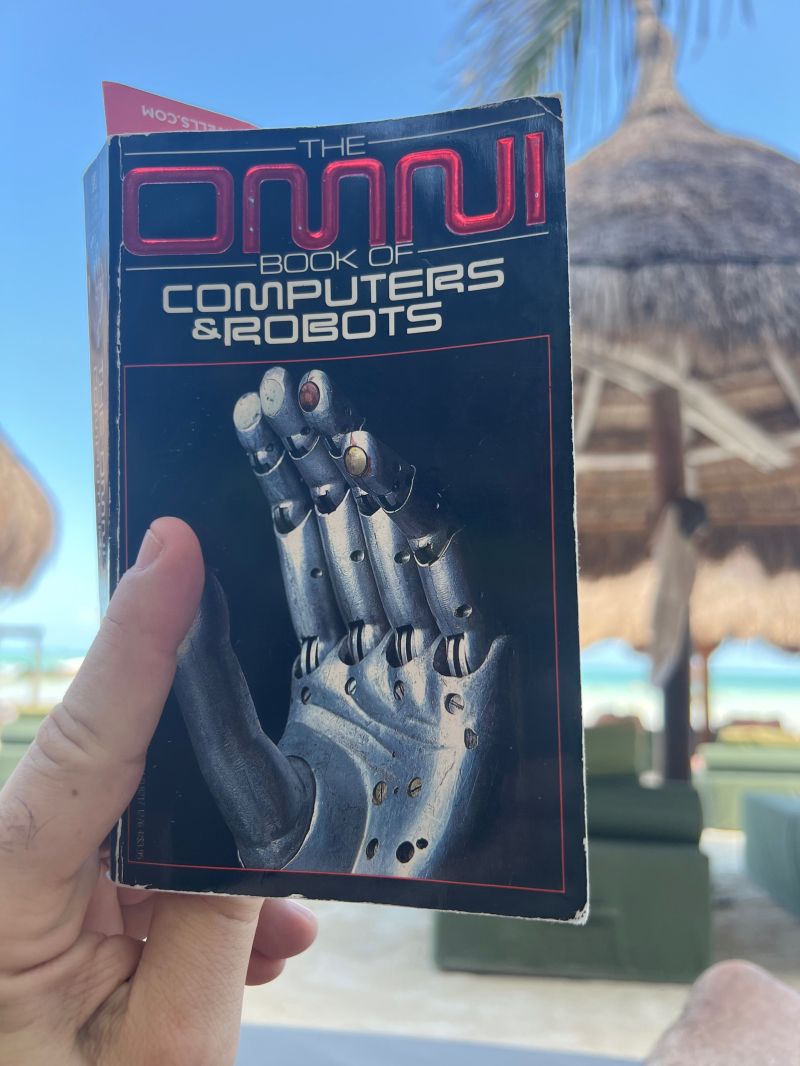
2024-8 Phone Booth
One of the last remaining twentieth-century technologies on the streets is nonfunctional phone booths. For some reason, they are kept installed but terminated. These are some of the few bulky devices we place next to our ears that precede the bulkier mobile phones. I take a photo of them each time I encounter one for nostalgia’s sake. It’s funny how people on the streets look at me when I do this.

2024-8- Tech Failures
I don’t know if anyone noticed that no one is speaking about the recent massive technology failures, namely the Crowdstrike worldwide tech failures. The issue faded away in the public eye so quickly. Maybe corporate lawsuits are being brewed behind the scenes, but the public eye has already moved to look elsewhere. It was the same when the news flooded about massive financial market downturns a few weeks ago. It is now all old news. One exception is that Boeing’s massive failures are still not easily forgotten because they remain in the news. Yet, no one will stop flying Boeing (not sure we always have options), just as no corporation will stop using Crowdstrike because no one wants the hassle of changing. Welcome to the same old world where people are quickly moving on past corporate failures because the media has already moved on to the next issue. If such behaviors continue repeating like that, we will continue to give free rein to corporate recklessness and lack of accountability. I am sure if these happened in countries that the US considers opponents of human rights, companies of such countries would cease to exist because massive failures are intolerable. And that is not a bad thing!
2024-9-1 Yin and Yan
Here is some free advice: If you didn’t know how to code before the recent version of AI existed, try to learn how to code without AI. If you know how to code, don’t leave behind everything you learned, and don’t put all your hands, feet, body, and soul in AI, hoping you can sit back, relax, and let it do the work. It won’t, plus you will become so lazy and technically useless when complex problems arise for those designated to solve challenging problems. Instead, blend your skills with AI skills. Only use AI when the issues are not easily solvable without AI. Be the yin and the yang with AI, and both of you together will get the problems solved.
2024-9- simple thoughts
-
A simple thought: when AI fails you, your human intellect is your best way forward. Spend less time prompting LLMs. Instead, spend more time writing, coding, reflecting, and, more importantly, thinking! What uniquely identifies us is our minds and not the size of whatever human part or tool we have.
-
I want to emphasize the difference between “keep looking for a solution” and “keep trying for a solution.” On the surface, both seem similar, but I believe they are worlds apart. The “looking” for a solution is someone checking for an answer on the web that matches the problem. The “trying” is implementing different approaches to solve the problem. If we only “look” and don’t “try,” we won’t learn forward to the next issue. Instead, we become accustomed to only looking at the same sources as more problems arise. However, the “trying” is tenser, more brainstorming, and allows for solid recollection of different approaches to future problem-solving. So the next time you need a solution, don’t LOOK for the answer with GPT since no one will be leading anything. TRY instead to solve it through strategy, exploration, and code.
2024-9 Retro
It’s sad to see rare artifacts from computing history sold in an auction. The items were originally part of Paul Allen’s Living Computer Museum in Seattle, previously open to the public for many years. After his recent passing, his family is selling them all away, the proceeds will vanish into trusts, and the museum is permanently closed. Thankfully, the Computer History Museum in California still exists https://lnkd.in/gkkDJGg2
#seattle folks, visit the Interim Computer Museum on 3100 Airport Way S tomorrow Oct 6. You will see and use lots of cool vintage computers including smart hacked machines. There is no cost to entry. It is all run by volunteers. Details at https://icm.museum/
Who remembers the IBM PC from the 80s, the 5.25 floppy, and dos 2.11. #retrocomputing rocks
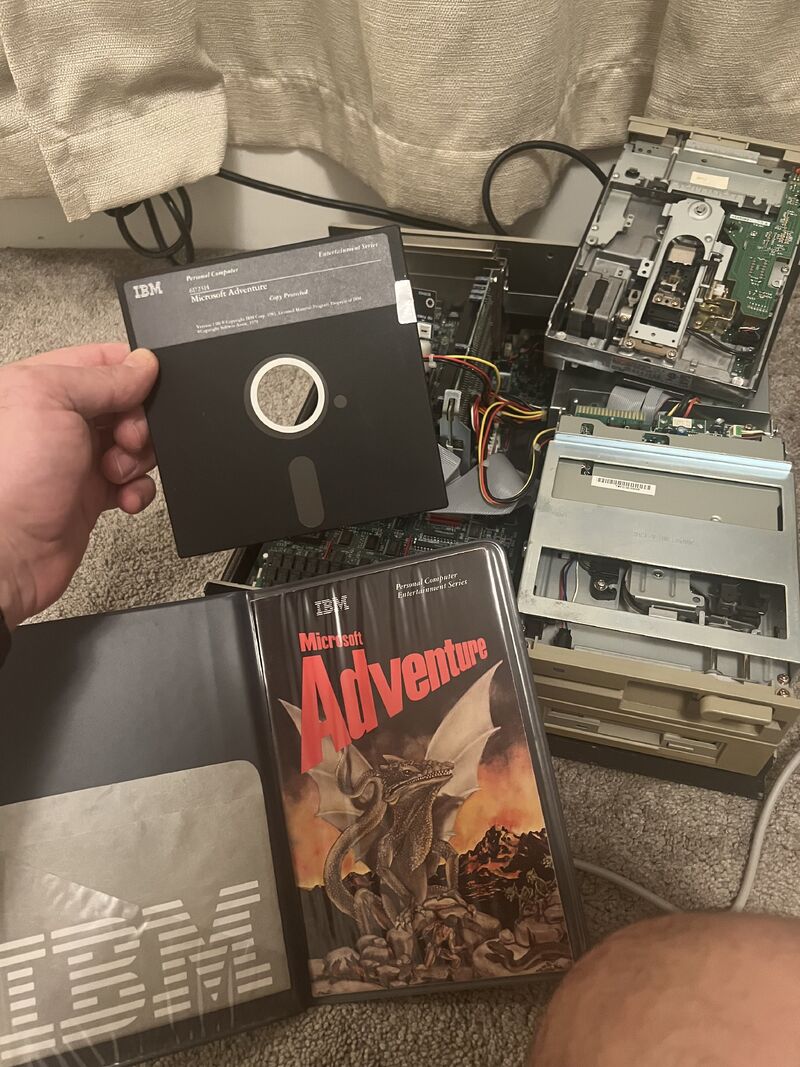
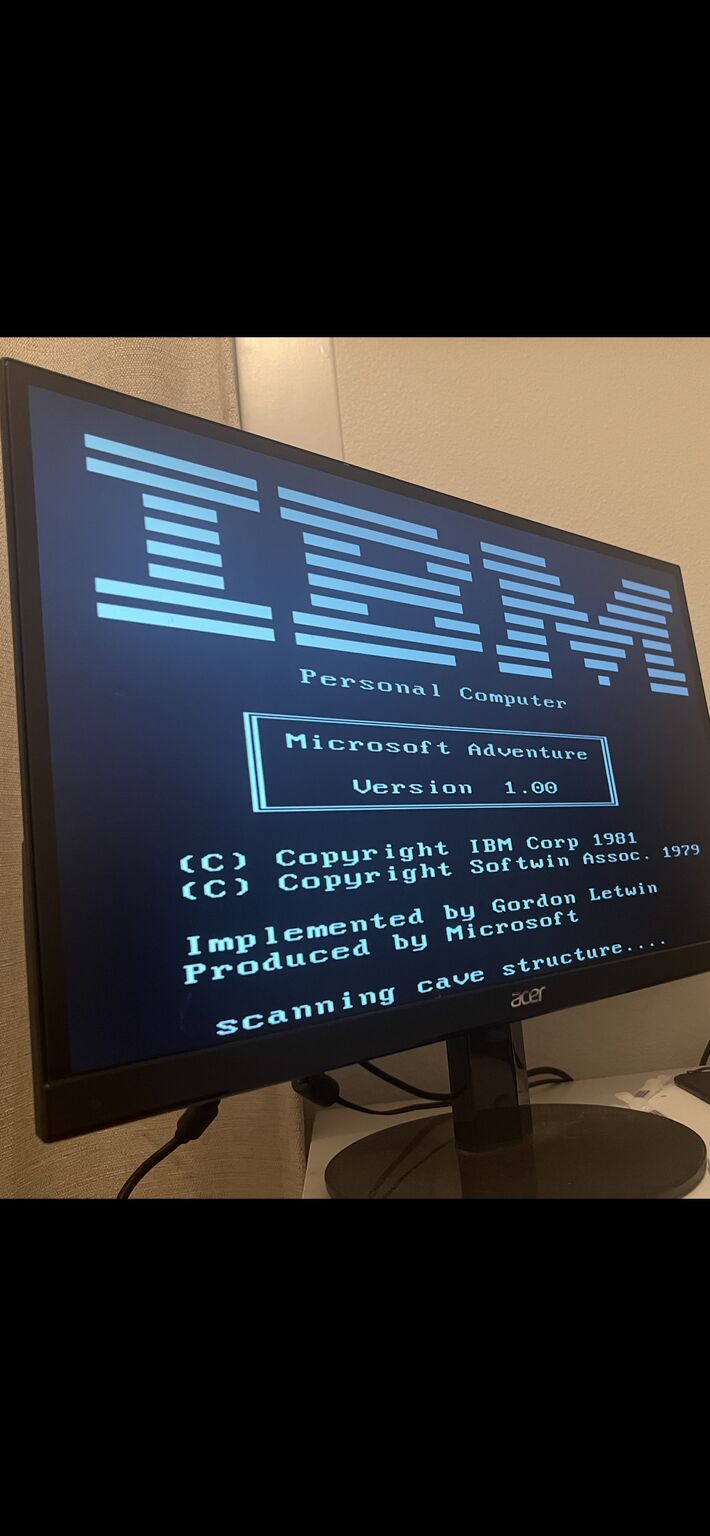
What a beautiful world when technology and media were best friends. The photo below is from Macworld magazine’s 1984 premier edition. The team on the left is the magazine staff, and the team on the right is the Macintosh team led by Steve Jobs. The photo, the headline, and all those faces should remind us that the tech world should not be centered around robotics, automation, and artificial products but around human relationships.
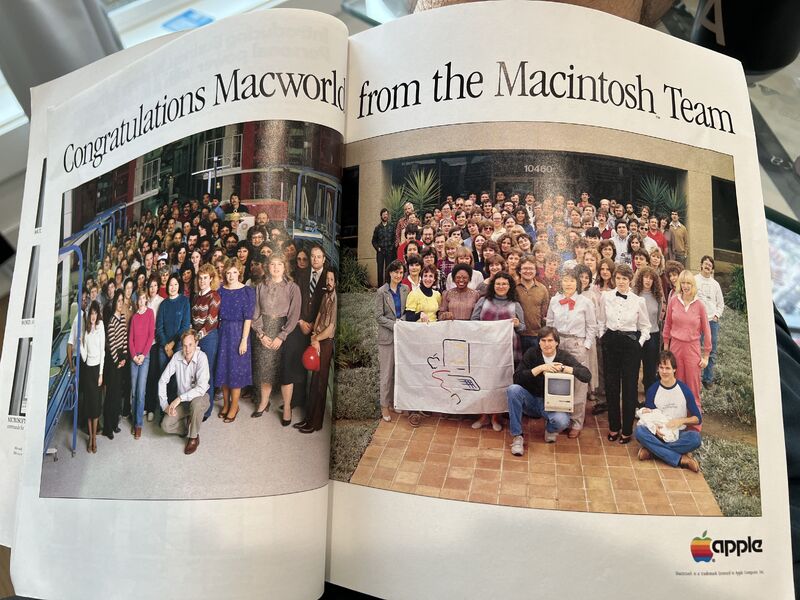
More than 15 years ago, I was at a games place with my kids when they were kids. They had just collected two token slips with single-digit numbers. Let’s say maybe 5 and 7. A young adult was at the toy booth. She looked at the numbers, picked up the calculator, and added 5+7=12. Then, she gave the kids something worth a quarter of a dollar. I should have been shocked about the ROI of taking my kids to that place, but what surprised me was using a calculator to add two single-digit numbers. She had no idea how to count or was too lazy to make a mental effort because the calculator is more intelligent since it generates the numbers by selecting the numbers to add. Fast forward to today. I think those “computer engineers” who use generative AI to let it code for them are acting the same way as that calculator lady. The less effort they make mentally, the more challenging it is to build on what is being generated. More importantly, coding is a mental capability, and the brain needs to be constantly stimulated, even the typing fingers. Not coding does not mean that the brain can think about more challenging problems. The mental laziness will carry over and become even worse. If someone needs generative AI to write code because they cannot write it themselves, they cannot call themselves programmers. Maybe they should label themselves “human computers,” just as the ones who used a microscope and a calculator to compute numbers were first called in the 1930s.
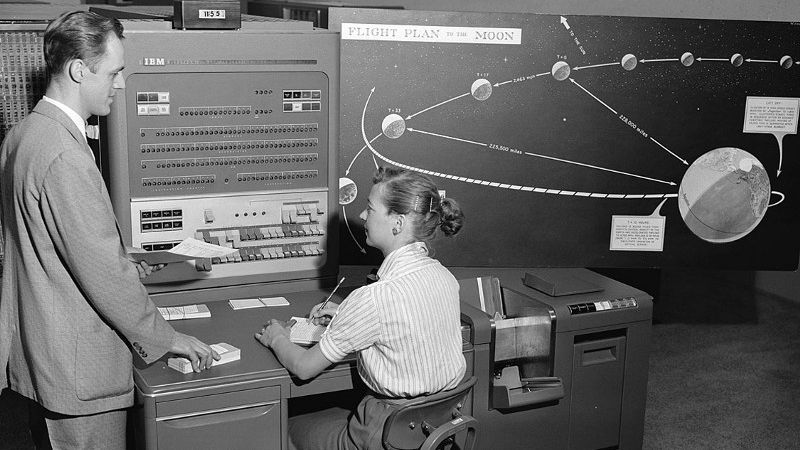
I acquired a vintage 1968 R203 triple flip flop for the famous PDP 8 minicomputers of the 1970s. Each flip-flop stores 1 bit of information. I don’t know if my computer class students would care to understand how bits were stored 50 years ago since I am not grading them about the past, but I will always do everything I can to showcase parts of computer history. Unlike what search engines tell you, PDP8 flip flops are not part of the shoe-wear category. #tech #computerhistory


First U.S. PhD in computer science: Mary Kenneth Keller (1965, University of Wisconsin) https://lnkd.in/gv2v87fX (from https://lnkd.in/gjqzejMp).

In the 30s, a “computer” was defined as someone who computes. This is an original book titled “Smith’s Computer,” published in 1937. It contained all sorts of computing tables for dairy farmers, ice cream manufacturing, live stock, and all sorts of business-related data. The book itself has proper indexing tabs (think Python Pandas) :), how to guide (think code repo’s README file), and even versioning (think releases). The first edition of the computer was in 1906. That is 119 years ago! The publishers were so confident with their data by saying “sold under a positive guarantee to give satisfaction or money refunded.” This is the 100 years old equivalent of a portable computer! Happy computing!
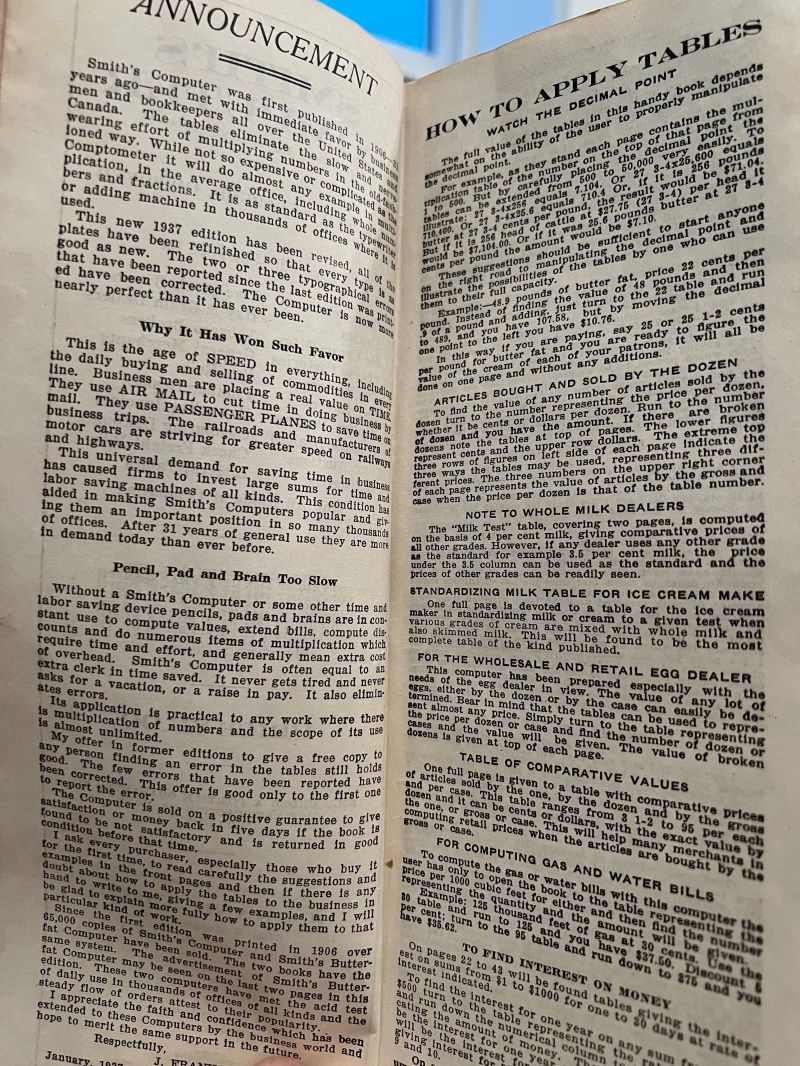
2024-10- AI and Tech
- A nice debate about the joy of actual coding AI stuff versus the joy of writing prompts in English to let AI write the code for you. Which one are you
- love to code for AI
- love that AI codes for you.
- I don’t like code and AI #tech #ai #genai
note: I am in (1)
In today’s age of AI, more food and beverage companies will get creative with manufacturing what we eat and drink. The government, as usual, is never serious about health. Otherwise, fast food and corn-based everything would cease to exist. As long as the non-GMO and organic labeling organizations are not tainted with for-profit goals, we should be much more literate and careful about what we eat and drink.
- Regular but not frequent changes to coding habits and setup are healthy. If you keep switching from one technique to another or cannot decide what editor, language, or pipeline, you will never do anything productive. If you do nothing different for a long time, you will miss out on better productivity techniques. If every year you have a New Year resolution for eating healthy and taking the gym more seriously than the past year, consider doing the same with how you code. Try to break some old habits. I was unaware that my Neovim coding editor was poorly set up until I decided to do some household cleaning with my coding environment. I changed something but broke another, but I discovered some things along the way. Yet, I cannot keep doing this a lot because I will end up not delivering and overly engineering. #tech #coding
The Unix Philosophy is more important today than ever before:
- Write programs that do one thing and do it well.
- Write programs to work together.
- Write programs to handle text streams, because that is a universal interface.
2024-10- The Internet
- OpenAI cofounder broke the news earlier this week that there is no more data on the Internet to train on (see article https://lnkd.in/g48T5YD6). Basically, the AI big boys scraped everything that can be scraped. This reminded me of the Time magazine July 24 1994 article “Battle for the Soul of the Internet - the world’s largest computer network, once the playground of scientists, hackers, and gearheads, is being overrun by lawyers, merchants and millions of new users. Is there room for everyone?”. 30 years ago, the answer was “yes, the Internet is for everyone”. Now, the answer can be: “the old backrooms are still there, but dusty and packed. Just take the lounge seat, relax, and pay the $200 monthly to enjoy the Internet at your fingertips.” #genai
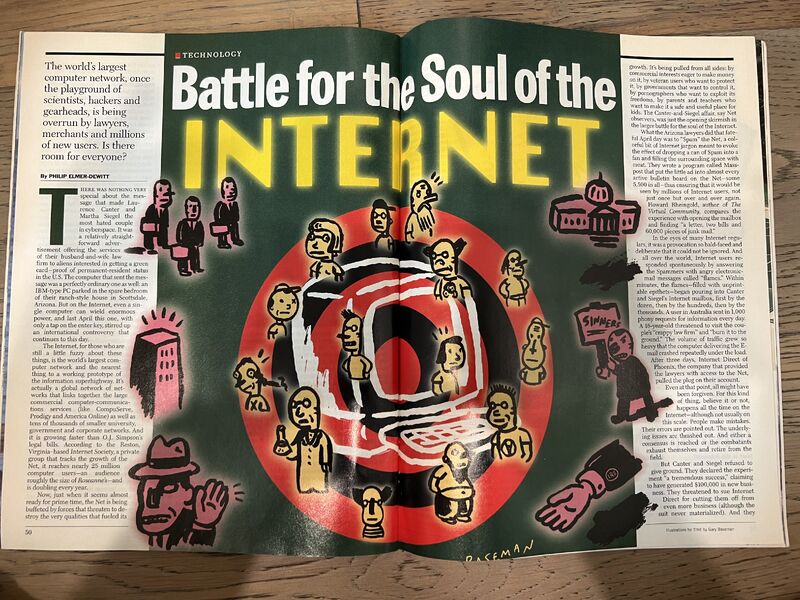
- When search engines on the web became popular, the Yellow Pages book below became anything but a reference guide. It mainly became a door stopper. Nowadays, the content on the web is more like junk. Fake sites, fake testimonials, clickbaits, and generative AI content. You can’t tell what’s authentic and what’s not. Search engines return search engine results that match one’s requests, but the sites look like they were auto-generated for the sole purpose of search engine retrievals. You can’t tell if a human wrote any of the content. Even worse, search engines and relevant sites provide AI chatbots powered by LLM that scraped the same content… So… trash in … trash out…. So, how is that different from the door stopper? Plenty… That yellow pages book has more value in its content than what the junkyard web is giving us nowadays. The 90s web was much better and more informative!!!

2024- Stranger in Strange Land
This book is a masterpiece. If you are contemplating what to read during your idle time, I highly recommend the uncut edition of Robert Heinlein (1961), Stranger In A Strange Land. It is one of the most popular science fiction books ever published. I only discovered Heinlen’s work recently, and, halfway through this book, it is the best one that I have read this year.
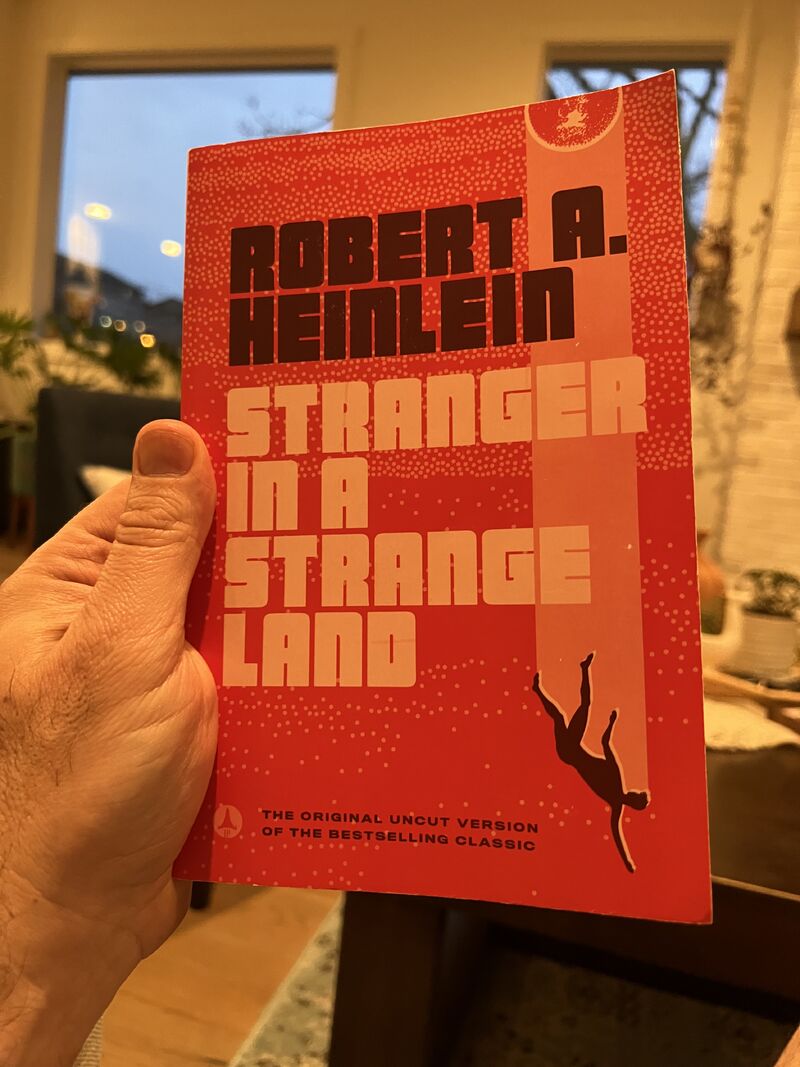
Enjoy Reading This Article?
Here are some more articles you might like to read next: